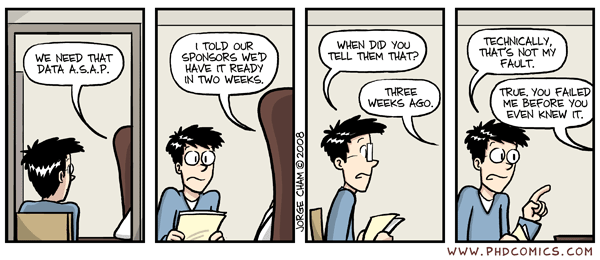"I need this ASAP."
"Can you start on this ASAP?"
"Let's meet ASAP."
You've heard time is money. So this idea of tacking on As Soon As Possible (ASAP) to the end of every request is our way of saving money (time). Everyone needs everything, urgently. But if everything is urgent, then nothing is really urgent, right?
With this ASAP mentality, we are creating an environment of hectic hustle and bustle; pulling our hair out trying to reach deadlines, make meetings, be productive, innovative, creative and (on top of it all) advance our own personal career goals. And this problem is only getting worse.
Not convinced? TripAdvisor ran an international survey on the top work activities workers typically do while on vacation. Here are the results:

Although time is not an unlimited resource, we need to stop prioritizing speed over quality and sacrificing our down time.
The Problem with ASAP
Other than the fact that we use it to portray a sense of urgency and more critical than all other tasks, the meaning of the term is completely subjective.
Does ASAP mean today or tomorrow? Next week or month? ASAP to the person giving the request can mean something completely different to the person receiving the request. Since the request is nebulous, it really provides zero insight into when the task should actually be completed.
Not only that, but this ASAP mentality is hurting employee engagement. As employees continue to rush and scramble to get ASAP tasks done on time, their confidence and motivation decreases and eventually leads to disengaged employees and burnout. Disengaged employees cost the US about $605 billion every single year.
So, let's shift over to the signs and signals that the ASAP mentality is taking over your workforce.
The Effects of ASAP
Confidence is Highly Affected
When someone requests something to be done ASAP, how does that make you feel? I doubt that it makes you feel empowered and motivated. Instead, it probably does the exact opposite.
Confidence is highly affected when someone tells you to get something done ASAP. Using ASAP as a way to label something as important is really just saying, "if you can't get this to me now, then you're worthless." How's that for killing confidence?
Instead, try saying something like, "This task is critical, what else are you working on so we can shift some priorities?" This way, you're not placing all responsibility to shuffle things around on the individual.
Plans Get Derailed
Plans go out the window when an ASAP task comes along. When the ASAP task is pushed to the top of the to-do list, all other important (and non-important, but still need to get done) tasks get pushed to the bottom.
Also, what may be ASAP to one person, might not be to another (and vice versa). So practice assigning deadlines to ASAP tasks. A deadline is more objective when there is a tangible date tied to its completion.

Productivity is Destroyed
Stopping a task dead in its tracks to start another ASAP task completely destroys the momentum and productivity you've made on the first task. Switching between tasks (also known as multitasking) actually takes you up to 40% longer to complete than if you were to tackle them separately.
Tackle one task at a time. If there is one task that comes up spontaneously, be clear and communicate that you are already working on a different task. From there, your manager should tell you whether to put that first task aside and focus on the critical one, or complete the task you're working on before switching to the critical one.
Trust is Lost
Using ASAP is a sure-fire way to lose the trust of everyone on your team. Dishing out subjective deadlines and creating unnecessary stress sets your team up to fail and you'll find them quickly resenting you for it.
Instead, focus on building trust by holding regular one-on-ones and have an open conversation around high-priority objectives. If a sudden, critical request comes in, lighten their load by passing along some of their other tasks to another team member.
Quality is Sacrificed
Without proper resource planning, the ASAP way of working can decrease quality by losing out on the time and manpower where you need it most. When you're looking at completing something as soon as possible, it's almost guaranteed that you'll be sacrificing quality to get it done on time. When that happens, the chances of having to make edits and put in more rework increase, and you find yourself spending the same amount of time (and sometimes more) working on it.
Don't let urgency overshadow quality of work. If something is going to take a bit longer to get right, clients and stakeholders are usually more than willing to wait a bit longer for good work then get something that doesn't meet their expectations.
Stop Using ASAP, ASAP!
If you consider yourself someone who turns everything into Mission Critical, then you might want to rethink your strategy. Sacrificing the confidence and trust of your team, other deadlines, productivity, and quality of work is not worth the time saved by finding the quickest way to bump something to the top of the to-do list. Rethink your mentality, and you'll find a surge of momentum and a whole lot of wiggle room.
What's Next?
So you're done with ASAP, now what? Here are some posts that will help make the transition to a smoother more productive workflow, easier:







